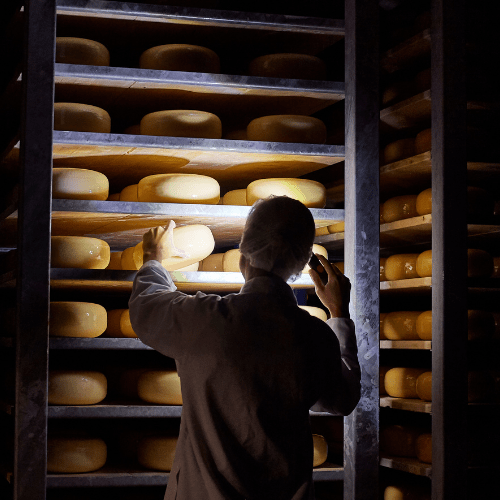Ripened cheese: the art of waiting for the perfect taste
At Henri Willig, everything revolves around the love of cheese and the art of maturation. Ripening cheese is a careful process that requires time, patience and expertise. Only in this way can the perfect taste be achieved. In this blog, we dive deeper into the maturing process of cheese, what is needed to do this, where the cheese matures and how you can mature cheese yourself.

What is cheese maturation?
Cheese maturation, or affinage, is the process by which cheese is kept under controlled conditions for a certain period of time to develop flavour, texture and aroma. Cheese maturation can vary from a few weeks to several years, depending on the type of cheese and the desired flavour. During this process, enzymes and bacteria in the cheese break down proteins and fats, leading to a more complex flavour and aroma.
What do you need to ripen cheese?
To ripen cheese properly, there are some essential factors:
- Temperature: The ideal ripening temperature is usually between 10-16°C.
- Humidity: A relative humidity of 80-90% is important to keep the cheese moist and regulate mould growth. In fact, with Gouda cheese, it is true that we do not promote mould formation, but prevent it!
- Ventilation: Good air circulation prevents the accumulation of moisture.
Where does cheese ripen?
At Henri Willig, cheese ripens on wooden boards in special ripening rooms. These rooms are carefully controlled for temperature and humidity to ensure optimal ripening conditions. The cheese is turned regularly to promote even ripening and treated with a coating to keep the surface clean.
How long does cheese need to mature?
How long cheese needs to mature varies from one type of cheese to another. We are happy to share with you an overview of how long some of our most popular cheeses need to mature for the perfect taste:
| Cheese type | Maturing time |
| Young Gouda | 4-6 weeks |
| Aged Gouda | 3-7 months |
| Extra Virgin Gouda | 7-10 months |
| Old Gouda | 10-12 months |
How do you ripen cheese yourself?
Maturing cheese yourself is a challenging but fun process. Here are some steps you can start with. Note that you need a whole, unbroken cheese wheel for this process.
- Choose the right cheese: Start with a young cheese of good quality.
- Provide the right environment: Create a room with a constant temperature of 10-15°C and humidity of 80-90%.
- Maintain the cheese: Turn the cheese regularly and check for mould growth. Wipe off any excess mould.
- Be patient: Cheese ripening takes time. Check the flavour and texture periodically to determine when the cheese has matured perfectly.
Henri Willig for all your favourite cheeses!
At Henri Willig, we have developed a wide range of naturally ripened cheeses over the years, from our award-winning goat cheese to our robust aged Gouda cheeses. The patience and care put into the ripening process result in a wide range of the tastiest and highest quality cheeses! Stop by one of our shops or order cheese online via our webshop.
Frequently asked questions
Maturation time has a major influence on the taste of cheese. Young cheeses have a mild and creamy taste, while longer-aged cheeses develop a more intense and complex flavour. With longer maturation, enzymes and bacteria in the cheese break down proteins and fats further, leading to a richer flavour profile and often a firmer texture. In addition, the loss of moisture during ripening is also an important factor for flavour and texture.
Maturing cheese at home can be a fun experience, but it can be difficult to achieve the same quality as at a professional cheese farm. Professional cheese farms like Henri Willig have precisely controlled environments and years of expertise to create the perfect ripening conditions. At home, they often lack this specific control over temperature, humidity and ventilation, which can affect the final result.



